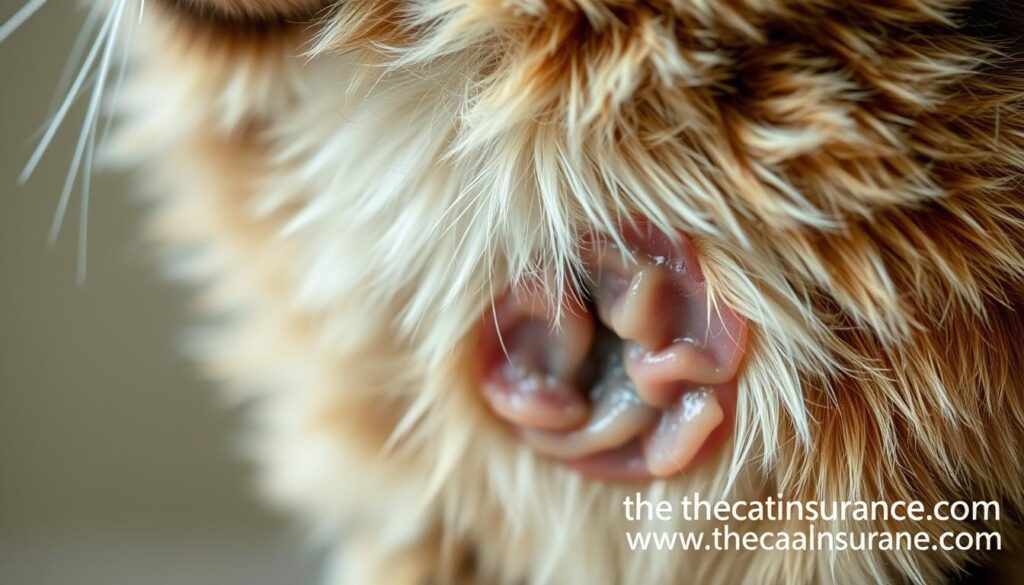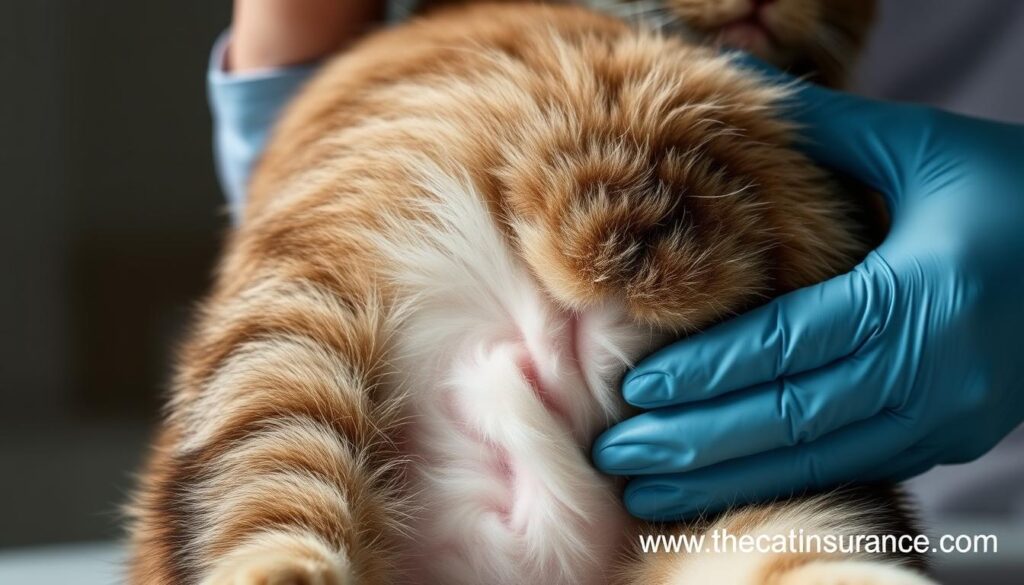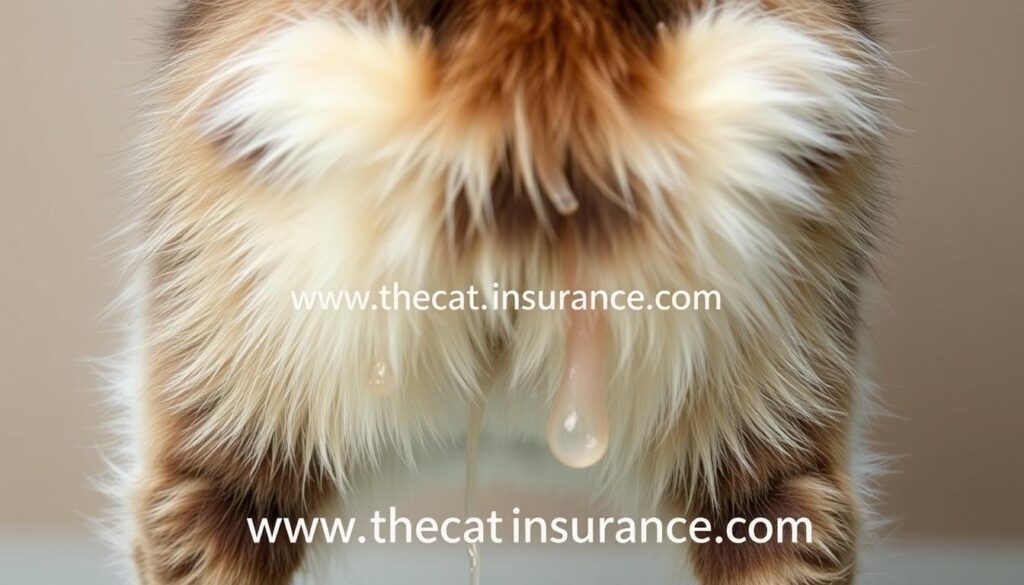As a concerned pet owner, you’ve likely seen your cat deal with diarrhea. It’s a common problem that can come from many sources. These include changes in diet, infections, and health issues.
It’s important to know the symptoms of cat diarrhea and how to treat them. This helps keep your pet healthy and eases your worries. Also, being ready for vet bills can help a lot.
Services like those from thecatinsurance.com can help with costs. This lets you focus on your pet’s health and happiness.
Key Takeaways
- Recognize the common causes of feline diarrhea.
- Identify the symptoms to determine the severity.
- Understand the available treatment options.
- Consider the financial implications of veterinary care.
- Explore insurance options for managing costs.
What Every Cat Owner Should Know About Feline Digestive Health
Knowing about your cat’s digestive health is key to their happiness. A healthy gut helps them get the nutrients they need. This keeps them full of energy and well.
Normal Feline Stool Characteristics
Healthy cat stool is brown, firm, and shaped right. It should not have blood or mucus. Cats usually go to the bathroom once or twice a day.
A healthy stool is a sign of good digestion. If your cat’s stool is different, like diarrhea or constipation, it might mean they’re not feeling well.
The Prevalence of Digestive Issues in Domestic Cats
Digestive problems are common in cats. They can come from diet, lifestyle, or changes in their environment. Studies show many cats face digestive issues at some time.
| Digestive Issue | Prevalence | Common Causes |
|---|---|---|
| Diarrhea | High | Dietary changes, infections |
| Constipation | Moderate | Dehydration, diet |
| Vomiting | High | Food sensitivities, infections |
Knowing about these common problems can help you spot issues early. This way, you can make sure your cat gets the care they need.
Common Causes of Cat Diarrhea
Cat diarrhea can upset both cats and their owners. Finding out why it happens is key to fixing it. Many things can cause it, from what they eat to infections.
Dietary Triggers and Food Sensitivities
Diet is very important for a cat’s health. Changing what they eat can lead to diarrhea.
Sudden Diet Changes
Switching cat food too fast can upset their gut. It’s best to slowly introduce new foods to avoid this.
Food Allergies and Intolerances
Some cats may react badly to certain foods, like beef or dairy. It’s important to find and avoid these foods.
Infectious Agents: Bacteria, Viruses, and Parasites
Infections are a common reason for cat diarrhea. Bacteria, viruses, and parasites can all mess with their digestive system.
| Infectious Agent | Common Causes | Symptoms |
|---|---|---|
| Bacteria | Contaminated food or water | Diarrhea, vomiting, fever |
| Viruses | Contact with infected cats | Diarrhea, lethargy, loss of appetite |
| Parasites | Ingestion of contaminated feces or soil | Diarrhea, weight loss, abdominal pain |
Stress-Related Digestive Upset
Stress can also cause cat diarrhea. Changes like moving or getting a new pet can stress them out.
For more on cat health and the costs of treating diarrhea, check out www.thecatinsurance.com.
Recognizing the Symptoms of Cat Diarrhea
It’s important to know the signs of cat diarrhea to help your cat quickly. As a cat owner, watching for changes in your cat’s behavior and health is key. This helps you catch health problems early.
Physical Symptoms to Monitor
Watching your cat’s physical signs is crucial for spotting diarrhea. Look for changes in stool and other physical signs.
Stool Appearance and Consistency
The look and feel of your cat’s stool can show if they have diarrhea. Diarrhea in cats means their stool is loose, watery, or soft. You might also see changes in color or blood or mucus. Noticing these changes helps you understand how serious it is.

Other signs like vomiting, being tired, not wanting to eat, or losing weight can also mean diarrhea. These signs might show a bigger problem that needs a vet’s help.
Behavioral Changes That Signal Digestive Distress
Cats often act differently when they’re not feeling well. They might become more alone, stressed, or have accidents outside the litter box. Watching for these signs is key to catching and treating problems early. If you see these behaviors, it’s time to talk to a vet to find out why your cat has diarrhea.
For more on keeping your cat healthy and the costs of treating digestive issues, check out www.thecatinsurance.com.
Acute vs. Chronic Diarrhea in Cats: Important Distinctions
Knowing the difference between acute and chronic diarrhea in cats is key for good care. As a cat owner, seeing your pet with diarrhea is worrying. But, knowing if it’s short-term or ongoing affects how you help them.
Acute Episodes: Causes and Typical Duration
Acute diarrhea in cats usually lasts under 14 days. It can be from eating something bad, diet changes, or viruses. You might see your cat get diarrhea suddenly after eating something odd or when stressed.
In many cases, acute diarrhea goes away with little help. But, watching your cat closely is important.
Chronic Conditions: When to Be Concerned
If your cat’s diarrhea lasts more than two weeks, it’s chronic diarrhea. Chronic cases can stem from food allergies, inflammatory bowel disease, or long-term infections. Persistent diarrhea is a worry because it can cause dehydration, weight loss, and more.
Seeing a vet is key to find out why and how to treat chronic diarrhea in cats.
Understanding if your cat has acute or chronic diarrhea helps you and your vet create a good plan. For more on keeping your cat healthy, check out www.thecatinsurance.com.
When Cat Diarrhea Becomes a Medical Emergency
Knowing when cat diarrhea is an emergency is key for cat owners. Many cases of diarrhea in cats get better on their own. But, severe or long-lasting diarrhea can cause serious problems.
Red Flags That Require Immediate Veterinary Care
Some symptoms mean your cat needs a vet right away. Look out for severe diarrhea, vomiting, blood in the stool, or if your cat seems very tired. If you see these signs, get your cat to the vet fast. This helps avoid dehydration and other serious issues.
- Severe or bloody diarrhea
- Vomiting
- Lethargy or depression
- Loss of appetite
- High fever
Potential Complications of Untreated Digestive Issues
Ignoring cat diarrhea can lead to big problems. Dehydration is a big risk, especially for kittens and older cats. It can be deadly if not treated. Also, long-term diarrhea can cause malnutrition and weight loss, making your cat weaker.
It’s important to get your cat the right care for diarrhea. This keeps them healthy. For more on cat health and treatment costs, check out www.thecatinsurance.com.
How Veterinarians Diagnose the Cause of Cat Diarrhea
Diagnosing cat diarrhea is a detailed process. It includes a physical check-up and various tests. Your vet will work with you to understand your cat’s health and find the best treatment.
The Initial Examination Process
Your vet will check your cat’s health during the first visit. They look for signs of dehydration, weight loss, or other symptoms. This involves asking about your cat’s diet, vaccination history, and any recent changes in behavior or environment.
Diagnostic Testing Options
To find the cause of cat diarrhea, your vet may suggest several tests. These include:
- Blood Work: To check for signs of infection, inflammation, or other systemic issues.
- Imaging: X-rays or ultrasound to examine the gastrointestinal tract and other internal organs.
- Stool Sample Analysis: To identify parasites, bacteria, or viruses that could be causing the diarrhea.
Blood Work and Imaging
Blood tests can show a lot about your cat’s health. They can reveal anemia, infection, or organ dysfunction. Imaging helps see the internal organs. This is key for diagnosing conditions like gastrointestinal foreign bodies or tumors.
Stool Sample Analysis
Testing a stool sample is key for finding infectious agents. Your vet may examine it under a microscope or send it to a lab. This helps identify bacteria or viruses causing the diarrhea.
Specialized Testing for Persistent Cases
If your cat’s diarrhea doesn’t go away, your vet might suggest more tests. These include endoscopy or biopsy. They help see the gastrointestinal tract and check for chronic conditions like inflammatory bowel disease.
This diagnostic process helps your vet find the cause of your cat’s diarrhea. They can then create an effective treatment plan. For more info on managing and treating cat diarrhea, visit www.thecatinsurance.com.

Effective Treatment Options for Cat Diarrhea
Diarrhea in cats can come from many sources. It’s key to pick the right treatment for their health. When your cat has diarrhea, knowing the treatment options is crucial for their quick recovery.
Veterinary Prescribed Medications and Therapies
Vets often give meds for your cat’s diarrhea. These can be antibiotics for infections, anti-parasitic medications for parasites, or anti-inflammatory drugs for inflammation. They might also suggest probiotics or prebiotics to fix gut balance.
Dietary Management Approaches
Changing your cat’s diet is important for feline diarrhea. Your vet might recommend a bland diet or a prescription diet for digestive issues. Sometimes, a hypoallergenic diet is suggested to check for food allergies. Always follow your vet’s diet advice for your cat’s recovery.
Supportive Home Care During Recovery
Supportive care at home is vital when your cat has cat upset stomach or diarrhea. Make sure your cat drinks plenty of fresh water. Keep the litter box clean to reduce stress and watch your cat’s health closely. If symptoms don’t get better or get worse, see your vet again.
Safe Home Remedies and Over-the-Counter Solutions
Veterinary care is key for cat diarrhea. But, some home remedies and over-the-counter solutions can also help. They should be used with professional advice to manage your cat’s symptoms.
Appropriate Home Care Practices
Keeping your cat hydrated is crucial when they have diarrhea. Encourage them to drink water. You can also add a bit of low-sodium chicken broth to their food to make it more tasty.
Watch your cat’s litter box habits closely. This will help you notice any changes or if the diarrhea persists.
Keeping their environment clean is also important. Clean their litter box often. Make sure their living space is free from stressors that could make their digestive issues worse.
OTC Products: Benefits and Risks
Over-the-counter products like probiotics and fiber supplements can help with cat diarrhea. Probiotics can help restore the balance of gut bacteria. Fiber supplements can help make stool firmer. But, always talk to a vet before using any OTC product to make sure it’s safe for your cat.
Some OTC products can be harmful to cats. So, it’s important to read labels carefully and follow your vet’s advice. For more info on cat health, visit www.thecatinsurance.com.
By using safe home care practices and over-the-counter products wisely, you can help your cat get better from diarrhea. Always do this under the guidance of a vet.
Preventing Cat Diarrhea Through Proper Nutrition and Care
To stop cat diarrhea, you need to manage their diet, reduce stress, and keep their environment clean. These steps can greatly lower the chance of your cat getting digestive problems.
Optimal Diet Choices for Sensitive Digestive Systems
It’s key to feed your cat a balanced, easy-to-digest diet to avoid diarrhea. Choose a high-quality, nutrient-rich cat food made for sensitive stomachs. Some cats do better with a simple diet or a new protein source.
Don’t change your cat’s food suddenly. This can upset their stomach. Slowly introduce new foods over 7-10 days to help their system adjust.
The Role of Probiotics and Fiber in Gut Health
Probiotics and fiber are important for your cat’s gut health. Probiotics keep the gut bacteria balanced. Fiber helps with regular bowel movements and stops diarrhea.
Think about adding probiotics or fiber-rich foods to their diet. But talk to your vet before making any changes.
Environmental Factors That Impact Digestive Health
Your cat’s surroundings can affect their digestive health. Stress from new pets or people can cause diarrhea. Keep their environment calm and stable.
Make sure they have enough litter boxes and try to reduce stress. For more tips on keeping your cat healthy, visit www.thecatinsurance.com.
How Pet Insurance Helps Cover the Costs of Treating Cat Diarrhea
When your cat gets diarrhea, the vet bills can be a big worry. But, pet insurance can ease this financial stress. It lets you give your cat the best care without spending too much.
Types of Coverage for Digestive Issues
Pet insurance plans differ, but many cover digestive problems like cat diarrhea. Some policies pay for tests like fecal exams and blood work. Others cover treatments, like meds and special diets.
For example, you can check out www.thecatinsurance.com to find insurance that fits your cat’s needs.
Understanding Deductibles and Reimbursements
When picking a pet insurance, knowing about deductibles and reimbursements is key. A deductible is what you pay first before insurance helps. Reimbursement is how much of the costs the insurance covers.
| Insurance Provider | Deductible | Reimbursement Rate |
|---|---|---|
| Provider A | $200 | 80% |
| Provider B | $300 | 90% |
| Provider C | $100 | 70% |
Knowing these details helps you make smart choices for your cat’s health and manage costs better.
Conclusion
Understanding and managing cat diarrhea is key for your cat’s health. Knowing the causes, symptoms, and treatments helps prevent problems. It ensures your cat’s digestive system works well.
Cat diarrhea can come from many things like bad food, infections, or stress. Watching your cat’s stool can help spot issues early. This way, you can act fast.
It’s important to get vet help when needed. Your vet can find out why your cat has diarrhea and suggest the right treatment. Also, pet insurance can help pay for these costs. This way, your cat gets the care they need without breaking the bank. For more on pet insurance, check out www.thecatinsurance.com.
By keeping your cat’s digestive health in check, you can avoid diarrhea and other problems. This makes your pet’s life happier and healthier.

